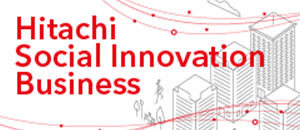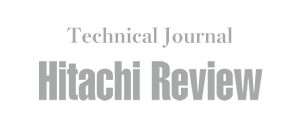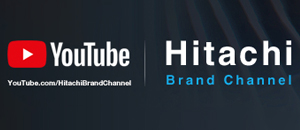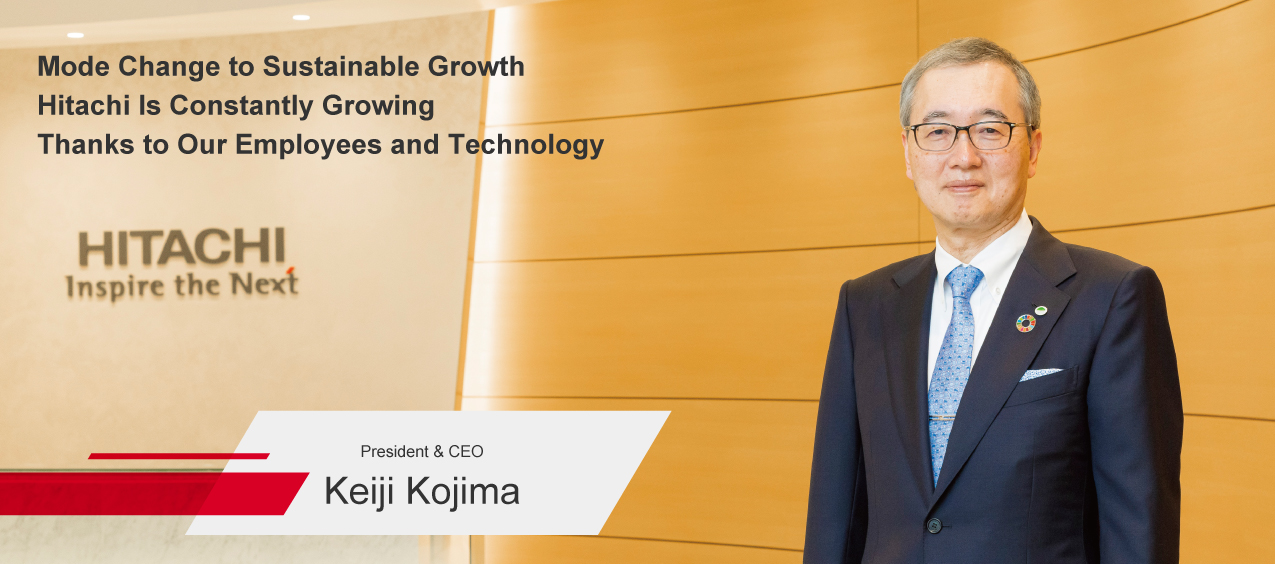
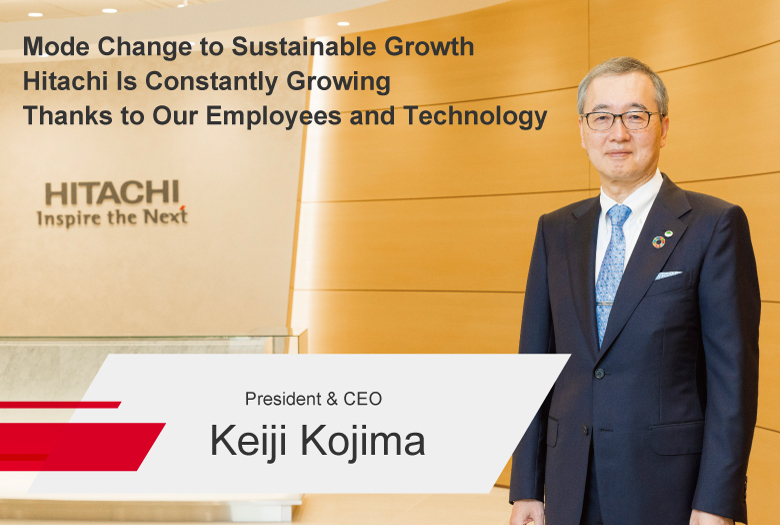
Fiscal 2022 marked a significant milestone for Hitachi. This pivotal year served as a crucial turning point, setting the foundation for growth in the next decade by leveraging the global groundwork established through a decade of reforms.
To achieve a sustainable society through data and technology, Hitachi remains committed to reforming its business portfolio, with a focus on its Social Innovation Business. In fiscal 2022, we streamlined our subsidiaries from over 20 to zero, aligning with our strategic objective of prioritizing core businesses while fostering growth. In 2023, we are proceeding with planned deconsolidation of Hitachi Astemo, our automotive components business.
In response to the three global trends of “Green,” “Digital” and “Connective” – which we believe are reshaping society – we have expanded and aligned our global assets. This includes acquiring ABB’s power grid business and GlobalLogic while converting Hitachi High-Tech into a wholly owned subsidiary. As a result, overseas assets now constitute 70% of Hitachi’s total assets.
With essential assets in place, we can now drive the Social Innovation Business forward, unified under a One Hitachi umbrella. Our main objective is to ensure that all our businesses can collaborate seamlessly, ushering in a new Hitachi culture. This transformation journey is an ongoing process, leading us towards a significant phase of substantial and sustainable growth.
As the CEO of Hitachi, I firmly believe that it is my responsibility to encourage this transformative mindset across the entire Hitachi Group.
To drive our expansion and achieve even higher growth rates, we have established a dynamic cycle with four key elements: evolving governance, continuously strengthening the portfolio, innovating technologies and business models, and making tireless efforts to increase corporate value.
Evolving governance is at the heart of our Social Innovation Business and the shift towards sustainable growth. We prioritize maintaining a global top-tier board and fostering Diversity, Equity & Inclusion (DEI) as crucial elements of our global human capital strategy, further strengthened by our strategic mergers and acquisitions. Transparent and effective governance, backed by the expertise of top executives from our board, has been instrumental in driving Hitachi’s structural reforms and growth. Additionally, DEI plays a vital role in capitalizing on the wealth of global human capital gained through the acquisition of ABB’s power grid business and GlobalLogic. We are committed to nurturing and acquiring digital talents, while enhancing employee engagement. To foster a sustainable growth mindset, we have implemented a progressive compensation system, revising the executive officer compensation scheme in fiscal 2023 to align with our growth-oriented goals.
As we set our sights on growth for the next decade, I am once again reminded of the critical role governance plays in our journey.
To elevate the One Hitachi mindset, we strive for even higher levels of governance with our primary focus on strengthening the portfolio to accelerate growth. The three global trends of “Green,” “Digital,” and “Connective,” which are attracting substantial capital, present remarkable opportunities for expansion.
The core concept of Hitachi’s business segments is to align assets with each trend’s high affinity. This approach ensures abundant growth in the Green Energy & Mobility, Digital Systems & Services, and Connective Industries sectors. We strengthen these sectors through continuous bolt-on investments enhancing each asset and maximizing synergies globally through mergers and acquisitions. Additionally, we optimize growth investments by routinely restructuring low-profit assets.
The next element is innovating technologies and business models. My focus is on creating a distinctive advantage in our Social Innovation Business, setting us apart from other companies. At the core of Hitachi’s Social Innovation Business is the concept of co-creation with our customers. To deliver competitive solutions, we leverage the synergy of Hitachi’s diverse “IT x OT x Products” portfolio and implement a co-creation framework through Lumada. By combining the Lumada framework with our robust global businesses, Hitachi creates unique value that only we can provide, all centered around our diverse human capital.
Furthermore, drawing on our back-cast corporate R&D function and start-up investments, we proactively anticipate customer challenges ahead of other companies, enabling us to develop the next-generation Lumada solutions based on these insights.
Hitachi possesses the unique ability to drive innovation through the synergy of our rich talents and innovation, making it a strength that sets us apart from other companies. Once again, I want to emphasize the significance of Hitachi’s technological excellence and innovation like never before.
My prior experience in research leads me to believe that we are witnessing a new era, particularly with the remarkable evolution of AI. Powered by the Lumada framework, Hitachi has been at the forefront, providing control AI for robots; analytical AI handling of statistical data, including diagnosing failure signs; and AI that recognizes and evaluates images. Additionally, the emergence of generative AI is a significant breakthrough. This type of AI holds the potential to replace some human intellectual activities to a certain extent, and I strongly believe that the most promising fields for us lie in applications related to system integration and digital engineering.
Records of actions and experiences that companies have accumulated through AI serve as tangible assets with learning attached. Since its founding, Hitachi has maintained a culture of “Ochibo-Hiroi,” which means “gleaning” in English. This involves learning from failure to further development and improvement. If an accident or malfunction occurs, we thoroughly investigate the cause, discuss measures to prevent a recurrence, and record it so that a similar accident never happens again. In this way, we have over 100 years of documented data, including planned improvements, which can be translated to AI language.
If we form a partnership with the Large Language Models (LLMs) created by the world’s leading IT companies and merge our unique content with them, we will be able to refer to similar historical records to predict accidents and failures and alert us.
Labor productivity can be dramatically improved by utilizing accumulated tangible assets and creating and deploying more distinctive LLMs. However, I believe that no matter how much AI evolves, human capital remains core. Humans, who have evolved through actions and experiences, can now use generative AI to supplement their linguistic knowledge. People remain free to focus on new, more complex initiatives and tackle new challenges.
For Hitachi, which has entered a sustainable growth, “Powering Good” is a guideline statement, along with Hitachi’s slogan “Inspire the Next.” We will continue to make tireless efforts to increase our corporate value by always questioning whether we are making good decisions to inspire society no matter the challenge (Inspire the Next).
Expanding the Lumada business ratio is important for enhancing Hitachi’s corporate value. In this way, we will sustainably achieve top-line growth and increased profitability. Lumada should continue to grow revenue by 15-20%, accounting for more than half of all Hitachi’s future revenue. We will also work on bottom-line stability and cash generation, with the aim of increasing EPS (earnings per share) to 600 yen or more and CFPS (core free cash flow per share) to 500 yen or more in fiscal 2024.
As a response to climate change, we have set a goal of contributing to the reduction of CO2 emissions by 100 million tons per year. The average reduction contribution during the Mid-term Management Plan 2024 is expected to reach 126.1 million tons per year (over three years). To achieve carbon neutrality in fiscal 2030, we expect to make gains at a pace far exceeding the target of reducing CO2 emissions by 50% in the Mid-term Management Plan 2024 and to achieve a 64% reduction in fiscal 2024.
As we promote our Social Innovation Business, Hitachi values the dialogue and co-creation with our diverse stakeholders, including customers, governments, municipalities, academic organizations, and research organizations.
We will live up to the expectations of our stakeholders with results, changing our business focus to sustainable growth. In fiscal 2022, we declared a shift to growth. That year required delicate navigation of a difficult management environment. In addition to the global uncertainty brought on by challenging exchange rates and geopolitical risk, responding to the shortage of semiconductors and soaring component prices were also major challenges. Even in this environment, Hitachi steadily expanded its business performance, especially in the areas of “Digital” and “Green,” and achieved an adjusted EBITA ratio of 9.5% in its three core business sectors and a record level of net income. We will continue to generate stable cash through organic growth and allocate it as investment in sustainable growth and shareholder returns in the form of stable dividends and share buybacks.
Hitachi is now growing for the next decade. Many of our customers are taking on the challenge of solving social issues, and we are encouraged by the accelerating pace of environmental change where our Social Innovation Business and co-creation models will thrive. We will continue to enhance our corporate value by reviewing the content of these activities, reflecting them in our management, and engaging in dialogue with our shareholders and other stakeholders. As One Hitachi, we will work to build a sustainable society and are excited to share the rewards of our success with you.
Fiscal 2023 will be a very important year for our growth. I believe this is the year that will test whether we can achieve the Mid-term Management Plan 2024, whether we can utilize the technological innovation of generative AI for our growth, and whether we can firmly implement all measures. Through the first step – fully executing the Mid-term Management Plan 2024 – I hope to gain the solid trust of our shareholders, who always lend valued input and management guidance.

